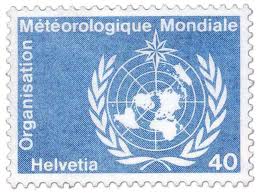 Today is World Meterological Day. Each year on 23 March, worldwide meteorological communities celebrate World Meteorological Day (WM Day) around a chosen theme. This year the theme is “Watching the weather to protect life and property”. This theme focuses attention on the crucial role of meteorological services in strengthening safety and resilience to weather events.
Today is World Meterological Day. Each year on 23 March, worldwide meteorological communities celebrate World Meteorological Day (WM Day) around a chosen theme. This year the theme is “Watching the weather to protect life and property”. This theme focuses attention on the crucial role of meteorological services in strengthening safety and resilience to weather events.
Weather extremes have a tremendous impact on our earth. The loss of life and huge economic loses were caused by weather, climate, or water related hazards such as tropical cyclones and storm surges, droughts, floods or related disease epidemics and insect infestations. About 90% of natural disasters are caused by Weather, Climate and water related hazards.
Weather extremes have a tremendous impact on our earth. The loss of life and huge economic loses were caused by weather, climate, or water related hazards such as tropical cyclones and storm surges, droughts, floods or related disease epidemics and insect infestations. About 90% of natural disasters are caused by Weather, Climate and water related hazards.
India Meteorological Department (IMD) under the Ministry of Earth Sciences is a national agency for meteorology and hydrology with responsibility to provide and efficient weather climate services for safety of our life and property and to contribute to the cause of national development. The department has implemented a comprehensive programme for modernization of its observational network by enhancing the network of AWS, ARG, DWR, Development of the GPS based digital radiosonde with ground receiver, sky radio meter for aerosol studies, Ozone monitoring and enhanced computational facility with high performance computing system. The dense observational network with reliable and real time transmission of data leads to improve our weather prediction capability.The dense observational network with reliable and real time transmission of data leads to improve our weather prediction capability. The DWR derived product are used for monitoring, nowcasting and accurate warning for severe weather events like flash floods, thunderstorms, duststorms, heavy rainfall, Gail wind, hail etc..
IMD provide current and forecast meteorological information for optimum operation of weather-sensitive activities like agriculture, irrigation, shipping, aviation, offshore oil explorations, etc. and warn against severe weather phenomena like tropical cyclones, norwesters, dust storms, heavy rains and snow, cold and heat waves, etc., which cause destruction of life and property. Timely warning of these severe weather events can save more lives and minimize damages to properties. IMD also provides climatological information required for agriculture, water resource management, industries, oil exploration and other nation-building activities.
In the present scenario of growing public awareness and requirement of meteorological information, India Meteorological Department has emerged as major service provider in the country. The meteorological information is not only important for over all economic development of our country but has a vital role for long term planning for industrial growth . Over time, there has been a significant reduction in the loss of life due to increase accuracy in early warnings issued by this department for natural hazards . Our services also contribute significantly toward the safety, economy and efficient operation of aviation, shipping and surface transport systems . It plays a crucial role towards mitigating the effect of catastrophic weather events like, flood and cyclones by issuing Quantitative Precipitation Forecast (QPF) for the river-sub-basin wise and cyclones track, intensity and landfall prediction respectively. The department has improved its cyclone prediction capability by reducing forecast error and improving track forecast skill with time and space.IMD is also responsible to provide early warning to all cyclone affected countries in Asia and Asia Pacific region . In agricultural sector farmers advisories and crop yield forecasts agricultural output using Space, Agro-meteorology and land based observations (FASAL) is being provided by IMD at different stages of the crops growth period which improved agriculture production in the country.
The worst implications of growing climate variability and change is a big challenge ahead during 21st Century. This department has multilateral international collaboration and multy departmental collaboration at national levels to exchange available meteorological and environmental information in order to protect our people against natural disasters and consequences from extreme climate change.
World Meterological Organisation (WMO) is a specialized agency of the United Nations Organization with its aim to reduce the loss of life and property caused by disasters and others catastrophic events related to weather, climate and water, as well as with goal of sustainable development and safeguard the environment and the climate for present and future generations
